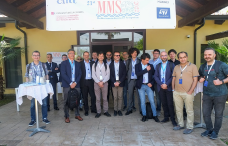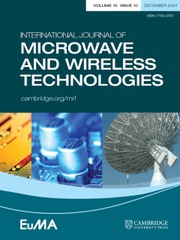Introduction
The Mediterranean Microwave Symposium (MMS) is a biennial conference that brings together microwave researchers and engineers from the Mediterranean region and beyond. The 21st edition of the MMS, MMS2022, was held in Pizzo Calabro, under the sun of South Italy, from May 9 to 13, 2022. This special issue of the International Journal of Microwave and Wireless Technologies (IJMWT) features extended versions of selected papers presented at the MMS2022 conference.

Overview of the MMS2022 Conference
As the General Chair of the Mediterranean Microwave Symposium 2022 (MMS2022), I am thrilled to present this special issue dedicated to the groundbreaking discussions and innovations that emerged from our conference. Held against the historic and culturally rich backdrop of the Mediterranean region, MMS2022 marked a significant edition of this esteemed symposium. We are indebted to Prof. Mohamed Essaaidi, the founder of MMS, for granting us the privilege to host this year’s event, symbolizing the Mediterranean Sea as a bridge connecting diverse cultures and fostering dialogues between the West and East.
The 2022 edition of the symposium was exceptional not only in its location but also in its rich and varied technical program. We had the pleasure of welcoming over 130 paper presentations across three parallel sessions, along with nine keynotes, two tutorials, a doctoral school, two workshops, and a brokerage event organized by the European Union’s Enterprise Europe Network. The conference was attended by over 250 participants from 25 countries. The breadth and depth of topics covered, from advanced microwave technologies to emerging trends in antennas and propagation, reflected our commitment to pushing the boundaries of microwave research and innovation.
The spirit of MMS2022 was encapsulated in the diversity and enthusiasm of its attendees. Scholars, industry professionals, and students from various parts of the world brought with them a wealth of knowledge and perspectives, enriching our discussions and fostering a collaborative environment. This special issue aims to capture the essence of these exchanges, featuring selected papers that highlight the innovative research and forward-thinking approaches discussed during the symposium.
I would like to extend my heartfelt thanks to all participants, whose contributions were pivotal to the success of MMS2022. Their passion and dedication to the field of microwave technology are what drives this symposium forward. Special appreciation goes to our committees, chairs, and the Local Organizing Committee members, whose tireless efforts ensured the smooth running of the event. Our sponsors, both technical and academic, deserve acknowledgment for their unwavering support.
Selected papers
This special issue of the IJMWT features extended versions of selected papers presented at the MMS2022 conference. The papers were selected by an international review panel based on their originality, technical merit, and relevance to the microwave community. The papers cover a wide range of topics, including antennas and propagation, passive components, active components, systems and associated processing, and emerging technologies and functional materials. The papers in this special issue of the IJMWT have the potential to have a significant impact on the field of microwave engineering. They provide new insights and solutions to important problems, and they will help to advance the state-of-the-art in microwave technology.

Acknowledgements
The Organizing and Local Committees of the MMS2022 conference would like to thank all of the participants, speakers, reviewers, and sponsors who made the conference a success. We are also grateful to the European Microwave Association (EuMA) for their cooperation in organizing this special issue of the IJMWT.
Luigi Boccia
General Chair, MMS2022

Luigi Boccia was heart born in Lungro, Italy, in 1975. He received the degree in information technology engineering from the University of Calabria, Rende, Italy, in 2000, and the Ph.D. degree in electronics engineering from the University Mediterranea of Reggio Calabria, Reggio Calabria, Italy, in 2003. Since 2021, he has been an associate professor of electromagnetics at the Millimeter-wave Antennas and Integrated Circuits Laboratory (MAIC-LAB) of the University of Calabria. His current research interests include antennas for telecommunications, radar and Earth observation applications, monolithically integrated RF circuits for phased array applications, and RF system integration technologies. He was a recipient of the 2022 Best Paper Prize from the IEEE Journal of Microwaves. He serves as an associated editor of the “International Journal of Microwave and Wireless Technologies” (Cambridge University Press), of “IEEE Microwave and Wireless Components Letters (MWCL),” and of “IEEE Antennas and Wireless Propagation Letters.” He also was the co-editor of the book entitled Space Antenna Handbook (Wiley, 2012).

Emilio Arnieri was born in Cosenza, Italy, in 1977. He received the M.E. degree (Hons.) in information technology engineering from the University of Calabria, Rende, Italy, in 2003, and the Ph.D. degree in electronics engineering from the University Mediterranea of Reggio Calabria, Reggio Calabria, Italy, in 2007. He is currently an associate professor of electromagnetics at the Millimeter-wave Antennas and Integrated Circuits Laboratory (MAIC-LAB) of the Department of Informatics, Modeling, Electronics and System Engineering (DIMES), University of Calabria, where he has participated in several national, European Union, and ESA projects. He has co-authored more than 100 articles published in international journals and proceedings of international conferences. His research interests include circular polarizers, developing dual-band antennas and millimeter-wave components, synthetic aperture radar, and beam scanning antennas. Dr. Arnieri is an associate editor for IEEE Antennas and Wireless Propagation Letters, where he received the Outstanding Associate Editor Award assigned by the Editorial Board of the IEEE Antennas and Wireless Propagation Letters 2021. He is also an advisory editor for the Engineering Reports (Wiley) and a guest editor for Sensors (MDPI) and Electronics (MDPI). He is the co-founder of the academic spin-off Antecnica.

Luca Catarinucci is an associate professor in Electromagnetic Fields at the Department of Innovation Engineering, University of Salento, Italy, and holds the chairs of “Microwaves” and “Electromagnetic Solutions for Hi-Tech.” He leads a dynamic research group with a keen focus on RFID and cutting-edge electromagnetic technologies in the realm of IoT. His research also encompasses the deployment of advanced electromagnetic simulation tools, the electromagnetic characterization of diverse materials, and the application of time-domain reflectometry for the qualitative and quantitative assessment of fluids. A significant part of his current research is deeply rooted in RFID-related pursuits, spanning across a broad spectrum including antenna and system design, the seamless integration of sensors and RFID tags, innovative strategies for RFID-based robot navigation, and pioneering methods for tag characterization, optimization, and design. His collaborations extend to numerous research teams, delving into areas such as antenna arrays, the manufacturing of antennas, and the role of 3D-printing in electromagnetics, among others. Catarinucci authored over 200 papers in international journals and conferences and four chapters in internationally recognized books. He is also the co-inventor of two patents, showcasing his commitment to practical and innovative applications in his field. In his professional journey, Catarinucci chairs the IEEE Technical Committee on Additively Manufactured Electronic Systems. He held the position of Vice President of Technical Activities at the IEEE Council on RFID (CRFID) for the 2022–23 tenure. As of now, he is the President-Elect of the IEEE Council on RFID for the 2-year term 2024–25.



